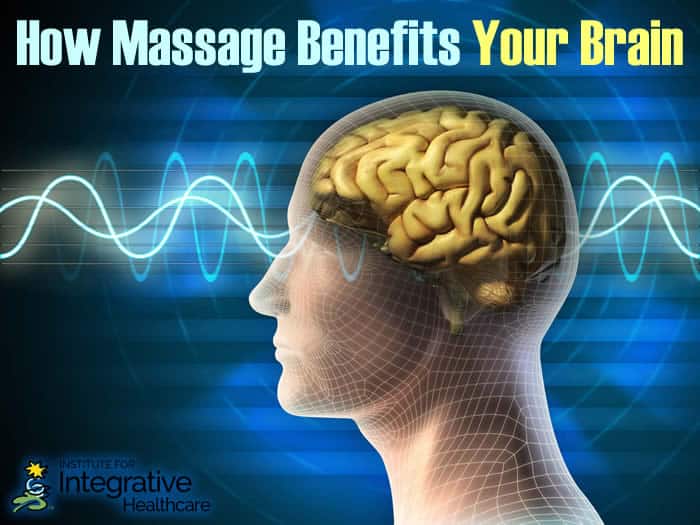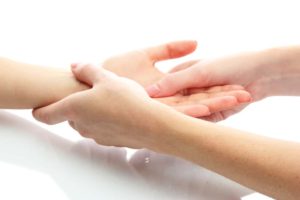

Massage helps promote proper neurological function throughout the body which translates to the brain better perceiving its environment. The brain works similarly as a computer. It is receiving a constant stream of sensory (input) signals, must interpret (integrate) this data and send appropriate motor (output) signal responses to govern movement and behavior.
The brain and spinal cord together create the central nervous system. A healthy distinction to make between these organs is that the brain governs consciousness whereas the spinal cord governs reflexes. Any neurological disease impacting the body’s ability to react in reflexive manner may be sourced from either the brain or spinal cord.
Massage is known to stimulate serotonin and dopamine, improve brain wave activity as well as quality of sleep, and activate parasympathetic response. (1) This article will delve into the many ways massage can aid brain health.
Sports Massage for Brain Health
Sports Massage is a prime example in which we witness the positive effects of better brain focus and clarity equating to healthier body function.
Jason VonGerichten, an instructor at the Soma Institute, writes “Sports Massage, at its essence, is a way for athletes to reconnect with their bodies, to put aside all other worries and simply focus on being their best….it is very clear to anyone who has ever played a sport, run a race or even just played darts in a bar that if your mind is distracted you will not be as competitive.” (2)
This statement clearly summarizes the effects of better brain health upon the body. When we help clients focus mentally, their physical body will respond more effectively.
Reducing Stress Hormones
Part of improving brain health involves the modulation of stress reduction hormones. A study in the journal Psycho-Oncology identifies “massage in patients undergoing intensive chemotherapy reduces serum cortisol and prolactin…a significant reduction in cortisol could be safely achieved through massage with associated improvement in psychological well-being.” (3) Reducing stress hormones can bring better ease and comfort to clients allowing one’s neurological system to function optimally.
Reflexology for Brain Health
Reflexology, a common complimentary modality to massage, is a welcome addition to improving brain health. A study in the Complimentary Therapy & Clinical Practice Journal in 2017 highlighted how “the application of reflexology induces changes in the activity of brain waves in correspondence with the appearance of a high degree of sleepiness and sleep.” (4)
This study indicates the effects of touch upon brain wave activity showing how touch may induce sleep cycles. Improved sleep can lead to better cognitive function and brain recovery over time. (5)
Lymphatic Drainage Therapy for Brain Health
Psychological stress can also be eased with lymphatic drainage therapy, a type of manual therapy. A study published in the Journal of Physiologic & Therapeutic Science indicated the application of lymphatic drainage techniques upon the abdomen reduced psychological stress, providing acute neural effects that increased relaxation in study participants. (6)
Massaging Feet for Autism

Another development seen in connection with massage and brain health is witnessed in the Autism population. Massage upon the feet was shown in a 2018 study to improve oxytocin release and activate brain regions associated with cognition (orbitofrontal and superior temporal lobe portions) for recipients with social dysfunctions such as Autism. (7) This discovery is exciting to see, as science is confirming massage’s effect on brain health on pathologic clients.
Massaging Hands for Dementia

Dementia is another pathologic condition witnessing remarkable brain health marker improvements with massage. Dementia features emotional lability and memory loss, both representing significant reduction in cognition function.
- Massaging the hands of dementia patients showed positive results in reducing agitation and improving biological stress markers in a study published by the Applied Psychophysiological Biofeedback Journal in 2018. (8)
- Similar results were witnessed in dementia patients as published in the Journal of Clinical Nursing in 2018 when aroma-massage (massage with Aromatherapy infused into session) showed improved cognition and brain function. (9)
- A third study encouraged health providers to suggest massage to dementia patients as published in the International Journal of Nursing Studies in 2019, as massage showed to improve behavioral and psychological symptoms. (10)
Brain Development for the Young

Massage is also shown to improve brain cognition and development of infants and children. For infants, a study published in the Journal Current Biology indicates gentle massage strokes upon C-Tactile (CT) nerve cells within the skin can reduce pain perception and facilitate a positive response to touch. (11) Also, the Touch Research Institute at the University of Miami, FL demonstrates in a study that babies receiving massages witness reduced stress behaviors along with improved muscle function. (12)
For children, similar results were witnessed from Touch Research Institute studies. Massage reduced anxiety in children and adolescent psychiatric patients in a study witnessing decreased cortisol levels and less anxiety. (13) Autistic children saw gains in cognition, improved social behavior, and better sleep – all indicators of better brain health. This particular study was published in the Journal of Autism and Development Disorders. (14)
Conclusion
As we observe as these studies emerge, we become more aware of how effective the brain can perceive and integrate sensory information. Positive sensory stimuli are being shown in research to create neurological effects within the brain.
To summarize, Sports Massage, Reflexology, Lymphatic Drainage and Aromatherapy techniques have proven effective in helping brain health as measured by affecting brain and stress-related chemicals, enhance brain wave activity, improve sleep, and activate parasympathetic response.











